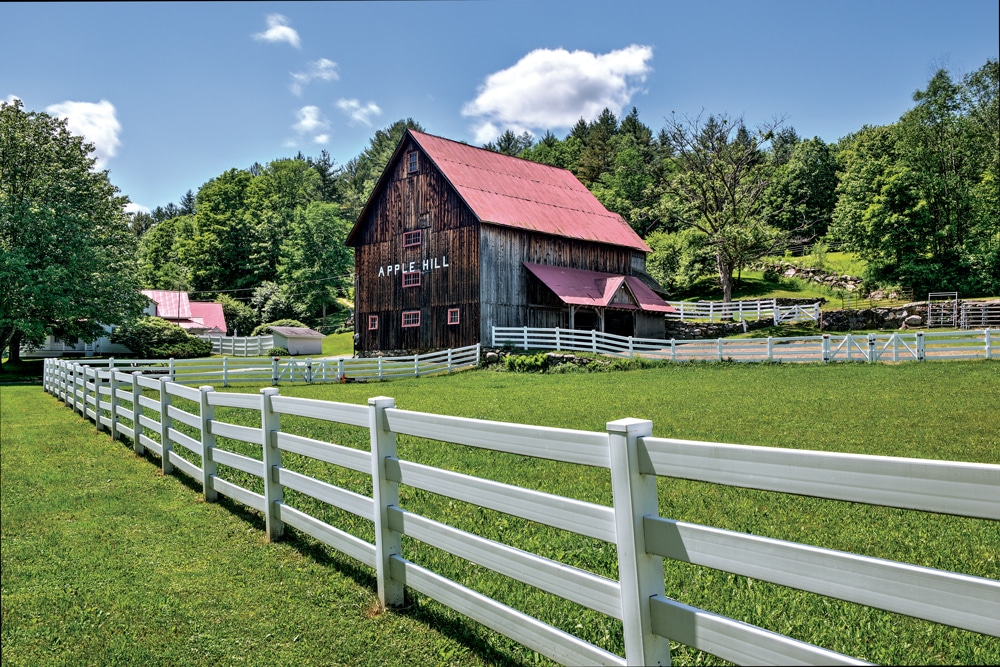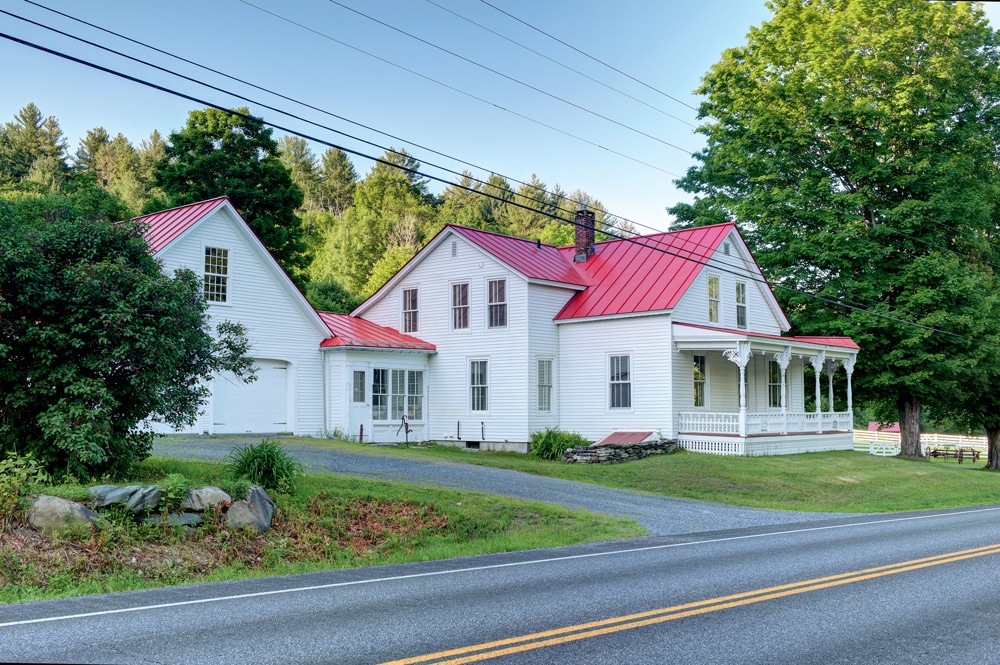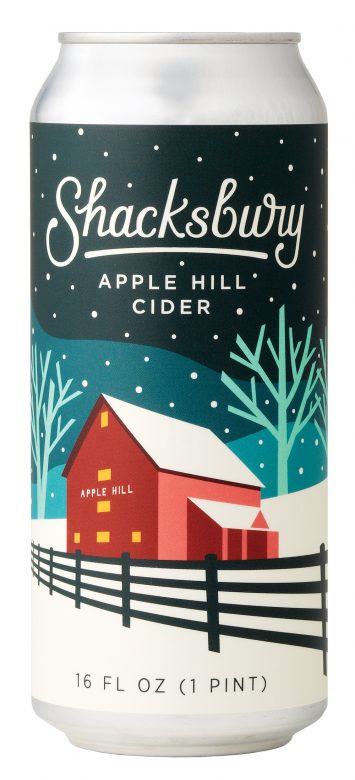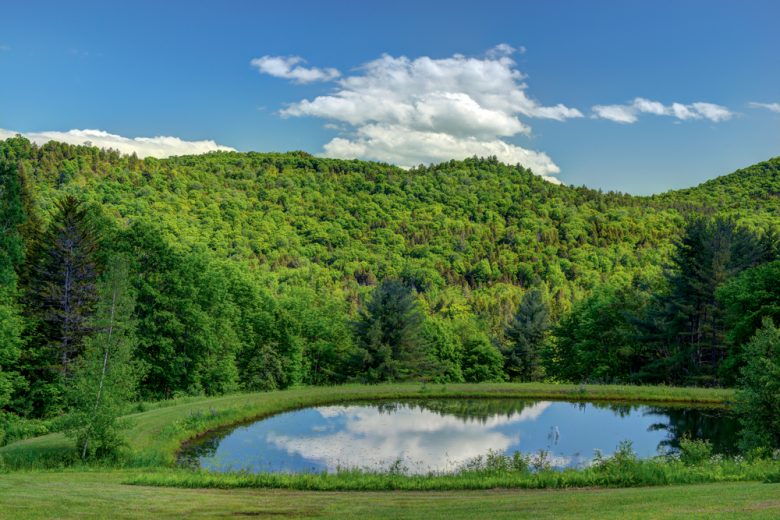Apple Hill Farm | House for Sale
A hillside studded with old-growth apple trees hints at the sweet life that awaits at this handsome Vermont farm and former B&B.

Farmers, would-be innkeepers, and anyone who loves sweeping rural views might find their next dream home in Apple Hill Farm.
Photo Credit : Lynn BohannonIf there were an encyclopedia entry for “idyllic New England,” the illustration might well show Apple Hill Farm. Nestled in the White River Valley, the farm is described in the National Register of Historic Places as a prime example of the self-sustaining hill farms that dotted Vermont’s landscape in the 19th century.
My visit to Apple Hill leads me through the village of Rochester to Route 73, which parallels the west branch of the White River and bisects the farm property less than two miles from town. Pulling into the drive, I imagine this is what entering a postcard would feel like. My gaze bounces from detail to detail: rebuilt stone walls, a 1920s milkhouse, a sugarhouse, scattered apple trees. Standing over it all is Apple Hill’s often-photographed 1875 “bank barn,” a structure most notable for the way it’s built into the landscape to allow “ground level” access to all three stories.

Photo Credit : Lynn Bohannon

Photo Credit : Lynn Bohannon
The main house, the barn, and the outbuildings are clustered to the north of the road, with Apple Hill rising behind. To the south, hayfields are sandwiched between road and river. To the west stands the Green Mountain National Forest.
Bob and Janet Aviano have owned Apple Hill Farm since 2001. Although it was their retirement property, chosen in part for its proximity to Janet’s family, Bob filled his days with one project after another, including preserving the historic bank barn. “I need to keep busy,” he told me in a phone interview before my visit. “Restoration was my hobby. It became my passion. ”
For my visit to the farm, my guide is the Avianos’ Realtor, Eric Johnson, who leads me from house to barn, down to swimming holes and up to pastures and fields, each with at least one story to be told.

Photo Credit : Shacksbury
Inside the barn there’s plenty to see—the post-and-beam structure, the wonderful workshop and collection of old farm tools, the wood stanchions of a former milking parlor—but the detail that most captures my imagination is nearly invisible. Had Johnson not pointed it out, I would have missed the set of six evenly spaced holes drilled into the wall of the barn’s top level, each providing a view of the back door of the house. We spend a few laughing minutes in speculation about what might have been happening up here to necessitate the peepholes. A Prohibition-era still? Kids playing hooky? An illicit card game? Hungry workers afraid of missing lunch?
The house itself, which dates to 1840, is a place that has been lived in and worked on, not treated as an artifact—it was extensively remodeled in the late 1890s and several times after that. The interior is simple and meticulously well kept, and it includes features from throughout its history. Three upstairs bathrooms call back to the house’s days as a B&B. The walls of the upper hall are curved (another mini mystery), and its pine floorboards appear to be original; downstairs, in the modern kitchen, a wide window looks out toward Apple Hill itself.
As my tour progresses, the history of the property comes into clearer focus via a series of farmers who left their names here. There was Haskell Hill, after settler David Haskell; then Austin Hill in the 1800s, when John Austin farmed here; and then, after it changed hands in 1862, the Ezekiel Emerson Farm, which is the name under which it entered into the National Register of Historic Places.
Over the years, this property has served many purposes. Emerson’s farm produced corn, oats, potatoes, butter, hay, maple sugar, and apples from more than 100 trees. In the years after World War I, owner George Burditt was known for the excellent potatoes he grew on the hillside. Subsequent owners remodeled the house in the 1970s to provide lodging for skiers (both Killington and Sugarbush are less than half an hour away), and the property was renamed Apple Hill. In 1998, a couple named Ronald and Nancy Halter bought the property and founded the Apple Hill Farm Bed and Breakfast.

Photo Credit : Lynn Bohannon
Today, the hillside hosts grazing pastures, growing fields, and a pond that’s been stocked with bass and bluegill—and of course there are those old-growth apple trees, which are kept tended thanks to Shacksbury Cider, which uses the fruit for its Apple Hill Farmhouse Cider. Partnerships like this keep the property active, from the farmer who hays the fields to the women whose horses graze in the upper pasture, seemingly nonplussed by the panoramic mountain view.
“It’s a property that is meant to be used,” Bob Aviano says, “but it’s time for the next owners to bring their own vision for it. I’ve always seen myself as steward of the property. It is still like it was, and I hope it stays that way.”
Apple Hill Farm in Rochester, Vermont, is listed at $779,000.
For more information, go to applehillvt.com or contact Eric Johnston of Four Seasons Sotheby’s International Realty at 802-779-1903 or email eric.johnston@fourseasonssir.com.
Joe Bills
Associate Editor Joe Bills is Yankee’s fact-checker, query reader and the writer of several recurring departments. When he is not at Yankee, he is the co-owner of Escape Hatch Books in Jaffrey, NH.
More by Joe Bills

